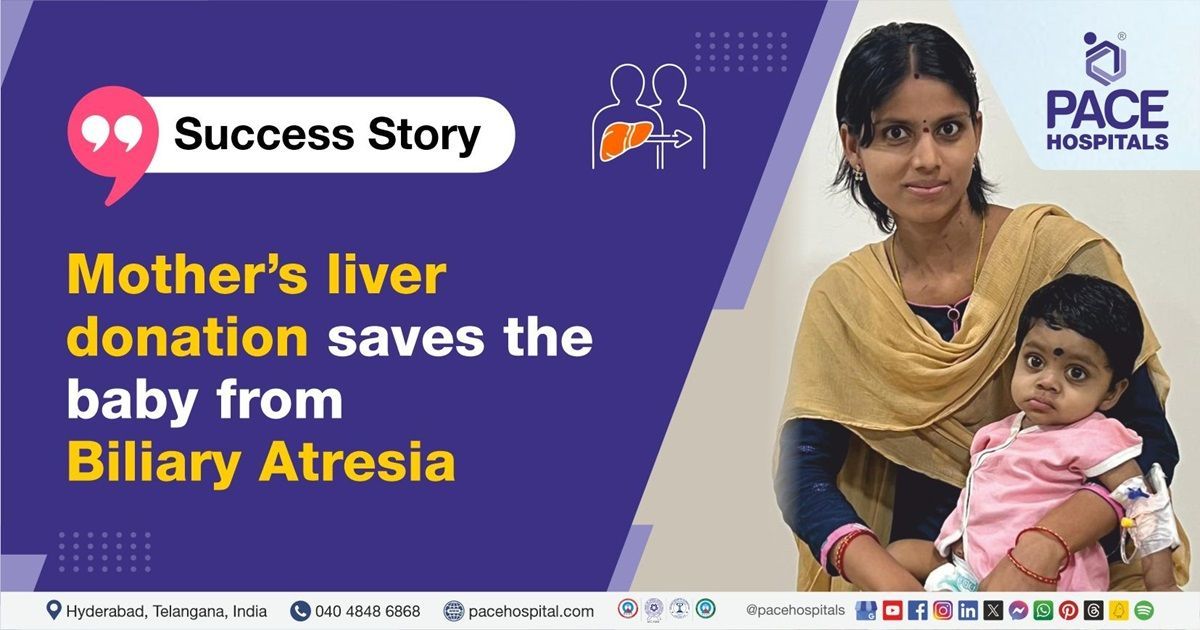A Successful Liver Transplant for a baby with biliary atresia | Case study
PACE Hospitals
Liver Transplantation team at PACE Hospitals carried out successful Living Donor Liver Transplantation (LDLT) for A baby with post Kasai cholangitis with annular pancreas. The transplanted liver portion was donated to the baby by the mother.
A neonate (Kiranmayee) of 1 year 2-month female is presented to the hospital with complaints of
jaundice and intermittent fever.
Medical History
Delving deeper, it was understood that the patient was experiencing jaundice since four months and was frequently associated with intermittent fever. The patient was diagnosed with biliary atresia type 1. She underwent Kasai’s surgery with duodenojejunostomy when she was 45 days old to get treated.
The patient had a history of hospital admission for viral pneumonia and cholangitis about a fortnight ago.
Diagnosis
Upon being admitted to PACE Hospitals and understanding the history and physical examination, the patient was subjected to
ultrasonography and cholangiography among other investigations. The investigations were focussed to identify any obstruction in the bile ducts. Evaluating the diagnostic investigations, the patient was diagnosed with:
- Post Kasai cholangitis with annular pancreas
- The Paediatric End-Stage Liver Disease (PELD) score is 14
Based on the diagnosis, the patient was evaluated for progressive liver dysfunction and was advised to undergo Paediatric End-Stage Liver Disease Treatment in Hyderabad, India, under the specialized care of the Liver Transplant Department.
Treatment
The team of liver transplant doctors including Dr. CH Madhusudhan, Dr. Govind Verma and Dr. Suresh Kumar asserted that a liver transplant was the only way to salvage/save the patient.
The patient was kept on multiple lifesaving supports. Understanding the condition of the patient, her mother came forward willfully to donate a portion of her liver. Since both the donor and the recipient share similar blood group (O+ve) there hadn’t been any incompatibility issues.
With necessary investigations done & clearances obtained, which included pre-anaesthesia checkup, the patient underwent Living Donor Liver Transplant in Hyderabad at PACE Hospitals, receiving the left lateral segment. The procedure was supervised by the liver transplant surgeons in Hyderabad at PACE Hospitals, and it was accomplished devoid of any complications.
The aftermath
The post-operative period was uneventful, which can be evidenced by the results of liver doppler test (a non-invasive test which studies the blood supply in and around the liver through ultrasound waves). During the post-operative period the patient developed high white blood cell count with having high lymphocytes which was managed conservatively.
Leucocytosis (increased white blood cells) is one of the common clinical findings seen in the post-transplantation period among liver transplant recipients. Although, leucocytosis in general circumstances is frequently observed as one of the early clinical signs of infection, in these transplantation cases, leucocytosis may also be regarded as rejection. With corticosteroid therapy, this condition can be neutralized.
The necessary medicines, immunosuppressives, antibiotics, proton pump inhibitors, multivitamins, antiemetics, analgesics, antipyretics & other supportive care were given along with the counselling. With the gradual development of liver enzymes in the donor’s body, the immunosuppression doses adjusted accordingly.
Once the patient achieved hemodynamic stabilization, she was discharged with the necessary medications and advice for follow-up.
Conclusion
This case highlights the success of Living Donor Liver Transplantation (LDLT) using a left lateral segment graft, showcasing the expertise and advanced Paediatric Liver Failure Treatment in Hyderabad, India. This procedure played a crucial role in restoring liver function and significantly improving outcomes for children with complex congenital liver disorders.
Biliary atresia and its treatment
One of the most serious congenital liver disease affecting infants, biliary atresia is the leading cause of childhood cirrhosis, liver failure, and the need for liver transplants. It is seen in 1 in 5,000 to 1 in 18,000 newborns, within weeks of birth presenting with prolonged jaundice and cholestasis (worsening bile flow), eventually being diagnosed by blocked bile ducts.
Hepatoportoenterostomy (HPE), also known as the Kasai procedure for biliary atresia, can restore the bile flow and prevent liver damage if performed within the first 2–3 months of life. Nevertheless, even with successful Kasai procedure, most children (over 70%) develop cirrhosis due to which liver transplantation is a must before adulthood.
Around 30% of liver transplant cases (donors) experience a brief rise in white blood cells (leucocytosis) within 1–3 days of surgery. This could be self-limiting (goes away on its own) within 48 hours if fever is not associated. It could be due to the body's response to the surgery and blood loss (rejection). In such cases, a
Liver Transplant doctor /specialist can prescribe immunosuppressive medications to help stabilize the patient.
Share on
Request an appointment
Fill in the appointment form or call us instantly to book a confirmed appointment with our super specialist at 04048486868
Appointment request - health articles
Recent Articles











